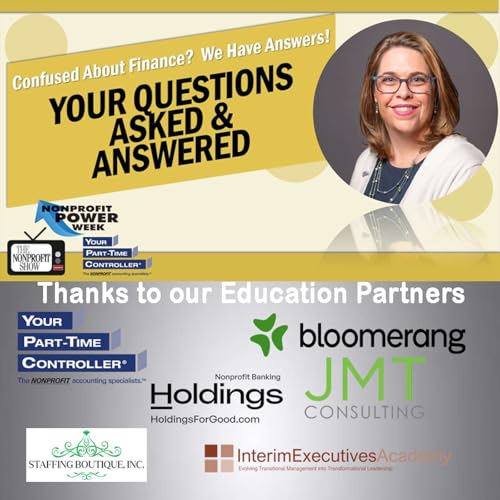
Nonprofit Power Week Finale: Finance Questions Answered
No se pudo agregar al carrito
Add to Cart failed.
Error al Agregar a Lista de Deseos.
Error al eliminar de la lista de deseos.
Error al añadir a tu biblioteca
Error al seguir el podcast
Error al dejar de seguir el podcast
-
Narrado por:
-
De:
Financial leadership is more than numbers—it’s the heartbeat of nonprofit sustainability. In this Nonprofit Power Week finale of The Nonprofit Show, Regional Director Ellie Hume of Your Part-Time Controller (YPTC) brings clarity and candor to some of the most frequently asked financial questions. With an “Ask and Answer” format, the conversation covers everything from roles and responsibilities in financial leadership to the evolving landscape of fractional CFOs.
Ellie sets the stage by redefining how we see finance in nonprofits: “Finance is literally the thread that draws every piece of the organization together because without it, nothing works.” She dismantles silos by urging finance professionals to engage deeply with program, marketing, and development teams to ensure that data isn’t just accurate but also meaningful for decision-making.
The discussion takes a practical turn as Ellie differentiates between controllers, comptrollers, and CFOs. She outlines the transactional oversight of controllers, the governmental nuance of comptrollers, and the strategic future-focus of CFOs. She also digs into the importance of internal controls, noting their role in fraud prevention and audit readiness.
The lively session shifts into the governance space. How often should boards review and sign Conflict of Interest (COI) policies? Ellie’s answer is clear: annually at minimum, but immediately when new conflicts arise. She gives a relatable example: a contractor-board member bidding on a capital campaign project must disclose and recuse themselves. Transparency, she argues, isn’t optional—it’s fiduciary duty.
Ellie also challenges assumptions about credentials. Do finance directors need to be CPAs? Her answer: “You truly just need great accounting skills and a strategic mindset to help the organization use financial information to make good business decisions.” Certifications like CPA or CMA add credibility but don’t replace experience or practical skill.
The conversation also explores the rise of fractional leadership. Ellie frames fractional CFOs as an efficient way to access high-level talent at a fraction of the time or cost, particularly useful during transitions or to prepare for a new hire. Fractional arrangements, she explains, can be both short-term bridges and long-term partnerships.
The conversation wraps with a powerful reminder for board members: ask tough financial questions. Are resources aligned with mission? What risks are we facing? Do internal controls hold up? And crucially—what training do board members need to responsibly interpret financial statements?
#TheNonprofitShow #NonprofitFinance #FractionalCFO
Find us Live daily on YouTube!
Find us Live daily on LinkedIn!
Find us Live daily on X: @Nonprofit_Show
Our national co-hosts and amazing guests discuss management, money and missions of nonprofits!
12:30pm ET 11:30am CT 10:30am MT 9:30am PT
Send us your ideas for Show Guests or Topics: HelpDesk@AmericanNonprofitAcademy.com
Visit us on the web:The Nonprofit Show



